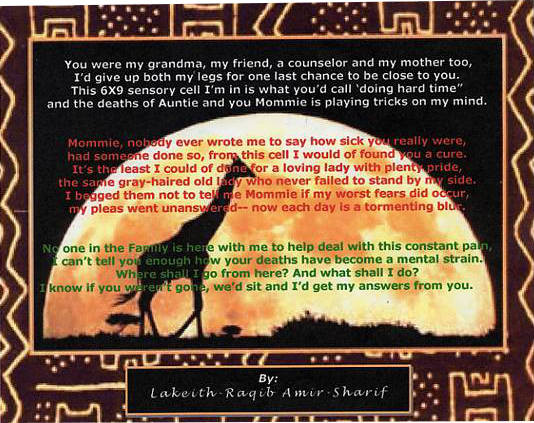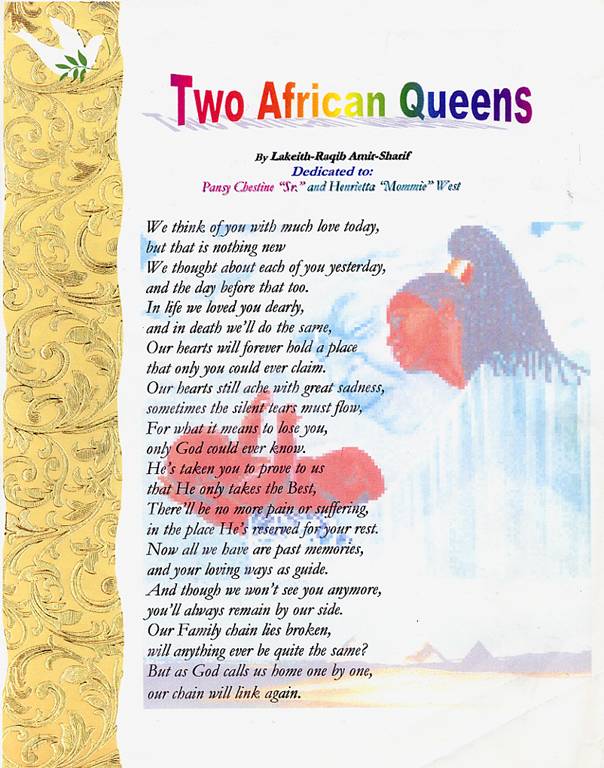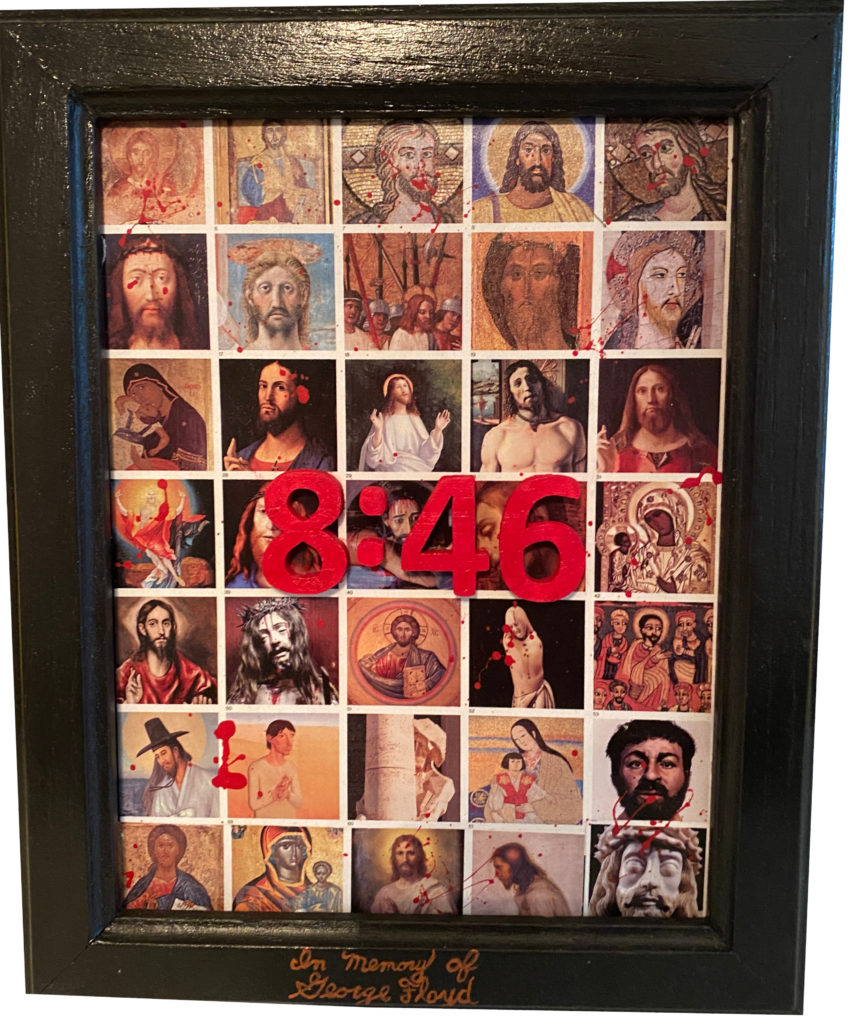Strange Fruit
by Lakeith Amir-Sharif
In this day and age, no one could make me believe.
We’d still witness the strangest fruit hanging with blood-stained leaves. From the Learning Trees to the back of the bus
Has someone again declared “Open Season” on all of us?
Can someone pass a law to legalize our Black skin?
Otherwise, the lynching will continue because of this genetic sin. Be it North, South, East, or West; you count the figures,
Black bodies are constantly murdered by all sorts of triggers. Disregard the fabricated, disturbing, or trite pretext,
The only concern is will I or a loved one be next.
The smell of blood lingers heavily in our nation’s air And those same Southern trees still prohibit you to stare,
From hooded individuals who terrorized the peaceful night
To the other types who left Blacks no choice but to take flight,
Yes, we are a strange fruit hanging for all to curse or hate,
In this day and time, this remains our unfortunate fate.
A simple traffic stop could result in our dying,
Listen closely to the wind; you’ll hear another Black mother crying.
It is scenarios like these for people worldwide to see,
Reminding all of the strange fruits hanging from that Southern tree.
Based on a poem by Abe Meeropol in 1939, and Roger Satnarine in 2015.
For All The Times
by Lakeith Amir-Sharif
(Dedicated to my children Tianna, Lakeith, Lashara, Quaneeka, Jalisa, Ashley/Ashantia, and Imani)
For all the times I missed a Christmas or a birthday gift.
For all the times you felt let down, when I just couldn’t be around.
For all the times I couldn’t call, or take you and your friends to the mall.
For all the times I couldn’t write, or wasn’t there to hug and kiss you good night.
For all the times you cried, because I wasn’t there by your side.
For all the times you needed to talk or maybe just you & I go for a walk.
For all the times I wasn’t there, and you may of thought daddy didn’t care
To compliment you on your grades or the things in school that you made;
To say good-bye as you left for school, thinking that your dad was really cool;
To take you to the park to play, to be with there with you every night and day;
To teach you to cook and play sports like a star, or help you learn to drive the family car;
To laugh, and play and win, or lose and come back to play again:
For all the promises not kept, for all the times I know you’ve wept.
For all the good times we’ve missed, for all the things you and I both wished.
You’ve had to grow up all alone, daddy trying to raise you in a visiting park and over the phone.
You’ll never know how much your daddy weeps, and prays to God your souls to keep.
There may be no chance for a long good-bye before the day comes for me to die,
So promise me one thing you’ll always do, and that is never forget…
Daddy always loved each one of you.
In the Interest of All Humanity
by Lakeith Amir-Sharif
I am opposed to the injustices of today’s system of society in which we live, not because I lack the natural equipment to do for myself, but because I am not satisfied to make myself comfortable knowing that thousands of my fellow beings suffer for the barest necessities of life and human decency.
We were taught under the old ethic that man’s business on this earth was to look out for himself. That was the ethic of the jungle and the wild beast. Take care of yourself, no matter what may become of your fellow man, woman, and child.
Thousands of years ago, the question was asked: “Am I my brother’s keeper?” That question has never yet been answered in a way that is satisfactory to civilized society. That question has never yet been answered in a way that is satisfactory to me, Sharif. So let me state for the record that “Yes,” I am my brother’s keeper and my sister’s keeper (and their children’s keeper). I am under a moral obligation to him, her, and their offspring that is inspired, not by any abstract idealism or maudlin sentimentality, but by the higher duty I owe myself and my Creator.
What would you think of me if I were capable of seating myself at a table and gorging myself with food while the children of my fellow beings were starving to death? What would you think of me if I were capable of sitting in silence as the state carried out your execution when I knew of the existence of evidence that proved you were innocent of the crime? What would you think of me if I stood by silently and said or did nothing as I witnessed one of your loved ones robbed, raped, or gunned down? Yes, I am my brother’s, sisters, and children’s keeper, and this loyalty transcends all (written and unwritten) ethnic, gender, economic, and religious precepts embraced in today’s society.
A Man Died Yesterday
by Kenneth West
Collect call from the Texas Department of Corrections. If you wish to accept press #1. “Hello?”
“Hey, Pat.”
“Hey, you alright? You sound down.”
Pause. “A man died in here yesterday. Guy named Ronnie Lake.”
“What? What happened?”
“I don’t know all the details. We never do. But word was that when he got up to go to his prison-assigned job in the laundry, he felt sick. So he went to the medical department instead, but they refused to see him.”
Now my sister sounded upset. “They can’t do that. Why didn’t they see him?”
“They said he had to put in a medical request slip and he would be seen within 72 hours.”
“But how did he die?”
“After he left the medical department he went back to his cell to lay down, and a few hours later his cellie found him dead in his bunk.”
“I can’t believe that. How old was he? Did you know him well?”
“I think he was about fifty. And I knew him as well as you can know anyone inside of a institution like this.”
I then proceeded to tell my sister how when I lived on another cell block a few years ago, I was friends with a guy we called Pasadena – who fortunately got out last year. At the time, Pasadena and Ronnie Lake were cellies, me and Pasadena were in college together working on our bachelor degrees from U. of Houston. And I would often stand at his cell door discussing class assignments, readings, etc. In this way I became familiar with Ronnie Lake.
Years later, after I had moved to another cell block and Pasadena had moved to the Faith-based dorm, I would still see Ronnie Lake because Ronnie worked in the shower; and he would always holler at me “lookout West!” – and he would try to make sure I got a decent prison uniform and some new clean boxer shorts, which I really appreciated.
(A note about Prison Culture: the state/Officers refer to inmates by our last names, and as a result most men in here who don’t go by a nickname have adopted this interpersonal dehumanizing practice. So even though my name is Kenneth, most people in here call me West. A few of us strive to break this cycle by calling one another by our given names, but it’s a uphill battle.)
But that was how I knew Ronnie, and if asked I would’ve said he was a good dude.
I didn’t explain all this to my sister, as she was still in disbelief that the medical department had refused to see Ronnie, and then a few hours later he was dead. This injusticed seemed to offend her ideas of how the world worked, or at least how she assumed it did.
So with anger and disbelief in her voice she said, “Kenneth, that’s just not right. I can’t believe they refused to see him.”
I listened to her indignation with the battle-weary resignation of a combat veteran, listening to a new recruit talk about what he or she thought war was like. When the fact is they had no idea. Just as 99.9 percent of Americans don’t have the slightest idea of what goes on inside of the house of horrors colloquially referred to as the “Department of Corrections”.
Along with Ronnie Lake, I could add the names:
Uncle Mike
Big Starks
Steve Smith
Money
Pretty Willie
Mr. Nelly
Big 5th
Fat Freddy
D-Town
and a few others. Most of these men were under 50, and would most likely still be alive if they had received prompt, competent, quality health care – something this is severely lacking in the American prison system.
Russian novelist Fyodor Dostoyevski said, “The degree of Civilization in a society can be judged by entering its prisons.” When I think about Ronnie Lake and his senseless death, or any of the other mental and physical degradations prisoners are forced to endure every day, I can only conclude that we as a society aren’t very civilized.
My sister was still venting about rights, and trying to maybe get in touch with someone when the pre-recorded phone company voice came on the line.
“You have one minute left.”
After spending all our allotted time talking about Ronnie and his tragic, senseless death – we had to rush and say everything else before the phone hung up, or I would be forced to to call back again which would cost another three or four dollars.
I said, “You talked to Momma.”
“Yeah, she good.”
“Tell her I’m call her tomorrow.”
“Did you get the fifty dollar I sent you for commissary?”
“Yeah, thanks.”
She said, “My vacation starts in two weeks. I’m try come visit you.”
“Okay.”
The phone company recording came back on the line.
“Thank you for using Securus.”
“I love you.”
“I love you, too.”
The phone went dead. Don’t know if she heard me or not. I hung the phone up and walked back to my cell, laid in the bunk and thought about Ronnie Lake. A man died in here yesterday, and the tragedy was that he didn’t have to.
Further Reading
Don’t Forget the Veterans Behind Bars – by Richard Shafer
How I Survived a Year in ‘the Hole’ Without Losing My Mind – by Michael J. Nichols
‘Our Minds Are Still Free:’ These Former Prisoners Find Strength Through Poetry – by Tyrone Turner
The Reality of Women Behind Bars
Education Behind Bars Unlocked New Meaning for Me – by Jesse Rinke
The Apology Letter – by John J. Lennon
‘American horror story’: The prison voices you don’t hear from have the most to tell us – by Melissa Brown
Life and Times of a Correctional Officer – by R. Mark Shepard
What’s It Really Like In Women’s Prison? Prison Girls
The ‘wHOLE’ Truth Behind Solitary Confinement – ACLU
Organizations
Brilliance Behind Bars
The Autry: Behind Bars: Incarceration in the West
“The function of reading is to educate and to teach one to think intensively, responsibly, and to think critically.
“Reading brings about education whose purpose is to replace an idle and empty mind with an open and creative one.
“Education is one thing no one can take away from you.”
— Elin Nordegren
Resources & Other BTB projects
Wrongful Convictions
Mission Statement and How To Donate
Voices Behind Bars
About Books Through Bars


